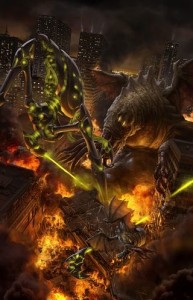![]() When a novel is adapted into a film or television series, how does compensation to the writer of the original novel work?
When a novel is adapted into a film or television series, how does compensation to the writer of the original novel work?
Does a studio pay the writer in one lump sum and then is allowed to do whatever they want with the property? Or does the original writer still benefit in some form if the adapted film or series is successful? For example, in the case of the television show Dexter, does Jeff Lindsay receive any extra compensation because the show has lasted as long as it has? Or was he paid only once, and then the success of the series makes no impact on his checkbook?
— Corey
I don’t know the specific deal with Dexter. But as a general case, yes, both scenarios are possible.
The studio (or producers) might pay a lump sum for all theatrical and/or television rights, generally structured as an option agreement. (Some money now for an exclusive hold on the rights, more money later if we decide to make it.)
Particularly in the case of a best-selling novel, the writer’s deal could include some form of backend. For a television series, that would likely be a specific amount per episode produced, along with a piece of the show’s profits. For feature films, it could be anything from a percentage of net profits (which almost never actually occur) to staggered bonuses at certain thresholds of domestic or worldwide box office.
Studios often buy books as manuscripts before they’re published. (That was the case with Big Fish.) In that situation, there may be language in the contract stipulating additional fees if the book enters the New York Times bestseller list, or some other event after publication.
For a novelist, a successful film or television adaptation should result in more sales of her book, and that money is all hers. The studio doesn’t get any portion of Stephenie Meyer’s publishing money for the Twilight series, nor Lindsay’s for Dexter.
